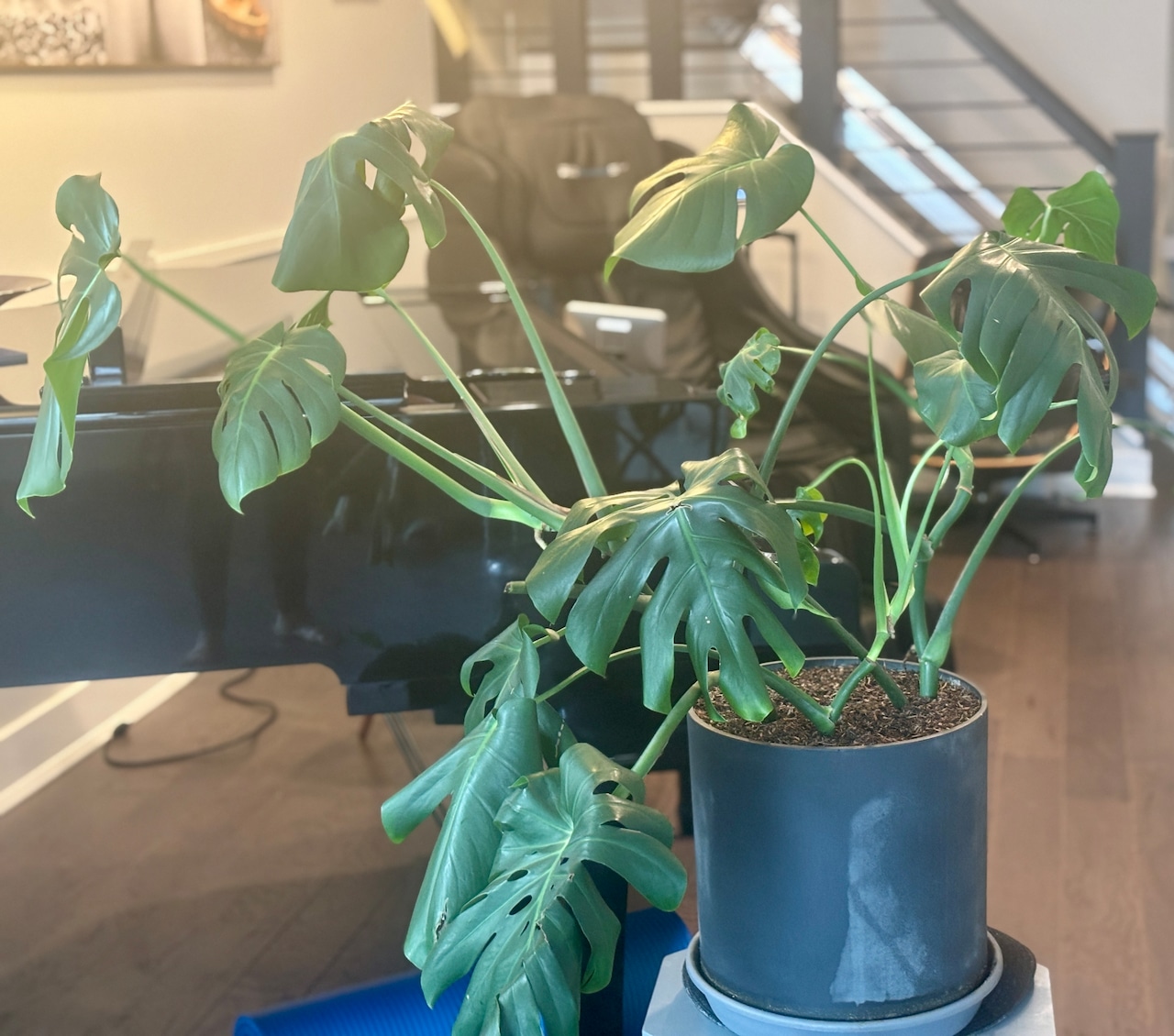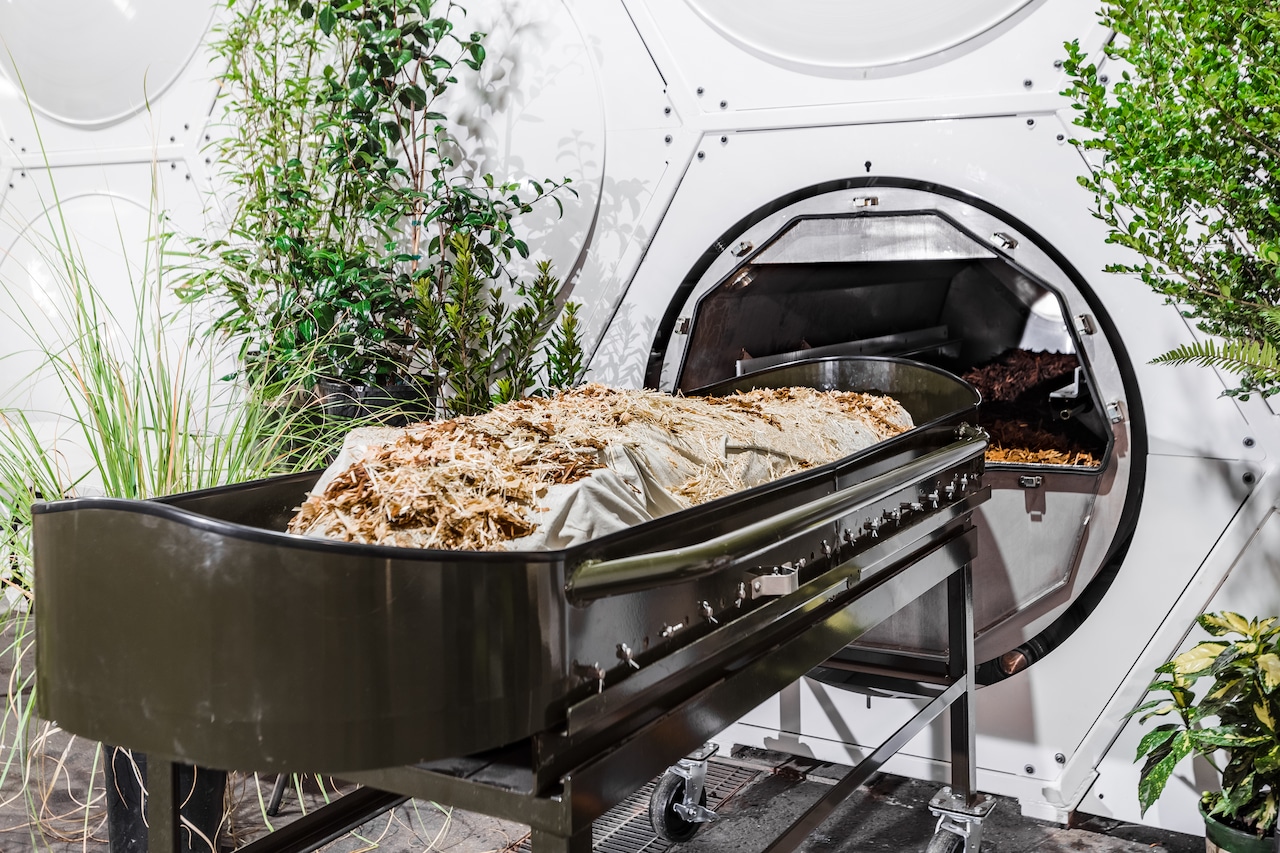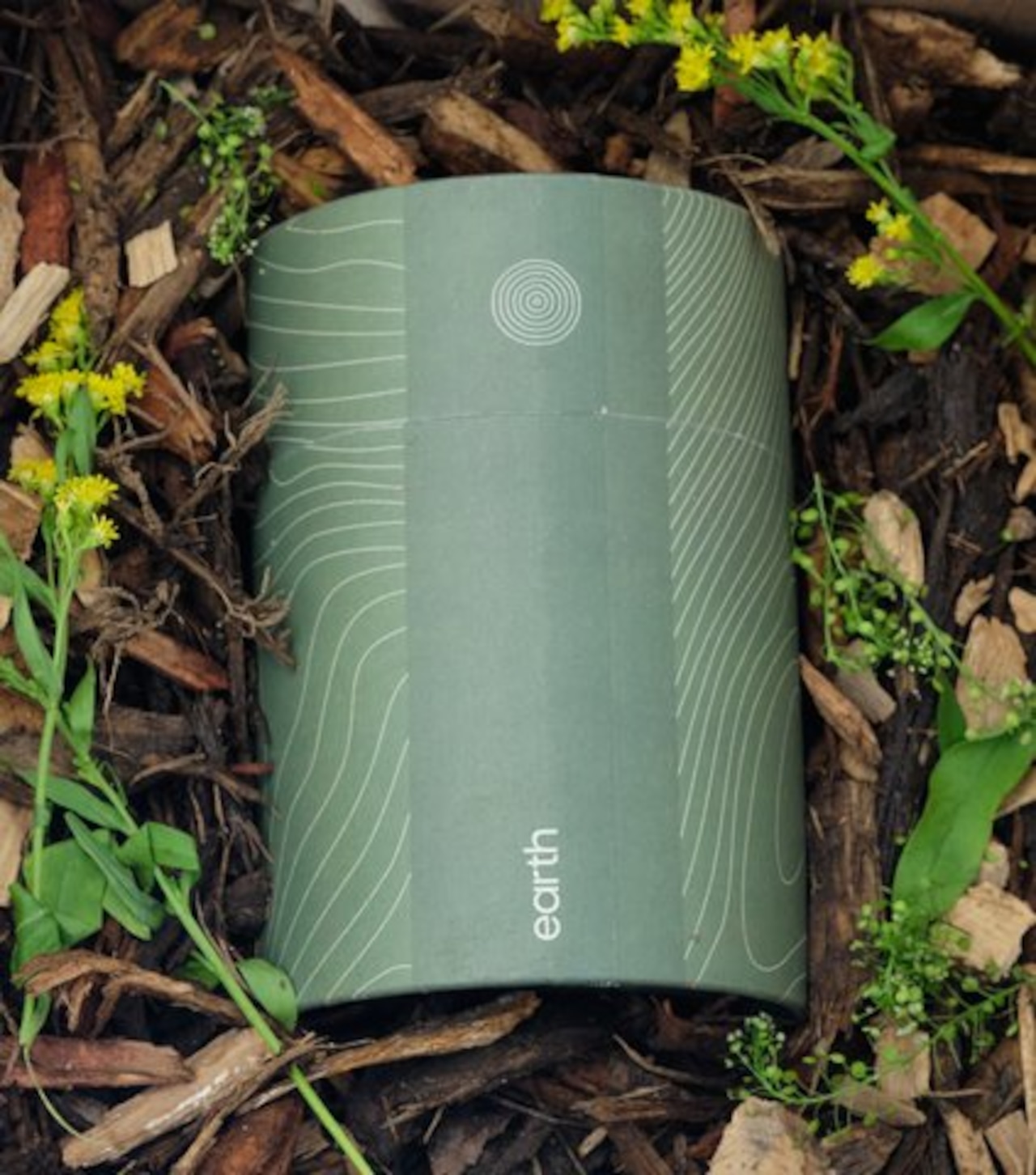The house plants in Dianne Thompson-Stanciel’s Tinton Falls home are thriving with the help of a new compost.
The leaves on her monstera deliciosa are a bright evergreen, their vines climbing taller than ever before. Her once stubborn peace lily is now vibrant and glossy.
Despite the flourishing greenery, Thompson-Stanciel said she doesn’t have a green thumb.
“That’s all Ken,” she said.
When her late husband Kenneth “Ken” Stanciel Sr. died in February, his body was flown across the country to one of the few companies certified in natural organic reduction, often referred to as human composting.
A portion of the compost generated from Stanciel’s body was given to his two adult sons, as well as Thompson-Stanciel, who uses it in her plants. The rest was donated toward habitat restoration. The whole process, including airfare, cost about $7,000.
“For me, it’s a wonderful feeling. He had been sick for a while, so we spent quite a lot of time in the house the last few years just us. So, with the compost here and the plants just thriving, it’s comforting,” said Thompson-Stanciel.
Soon, New Jersey residents won’t have to board a flight post-mortem if they want their remains turned into compost.
 Dianne Thompson-Stanciel said she feels comforted by her husband’s compost in the plants throughout her home. Dianne Thompson-Stanciel
Dianne Thompson-Stanciel said she feels comforted by her husband’s compost in the plants throughout her home. Dianne Thompson-Stanciel
The practice could be coming to the Garden State under legislation that passed the Senate and Assembly in June that would allow for the creation of human composting facilities operated under the supervision of a licensed funeral director.
The bill is headed to Gov. Phil Murphy’s desk, where it will either be signed into law or rejected. If approved, New Jersey would join 13 other states that have legalized human composting since 2019.
“It’s just another option for folks,” said Sen. Joe Vitale, D-Middlesex, one the bill’s primary sponsors, who also sponsored legislation that brought physician assisted suicide to the state.
Interest in green funerals — whether its composting or natural burials — is rising, according to a report by the National Funeral Directors.
Sarah Javed, 35, of Metuchen, said the idea of a traditional burial “always gave me that horrible feeling of panic.”
And the idea of cremation never sat right with her husband, Alfonse, a senior pastor at First Baptist Church of Metuchen. The couple, who have four young children, were creating a will when Javed joked to “just put me in a burlap sack and put me in the ground.”
“I mentioned it to someone and they said, ‘You know, that’s an option,’” recalled Javed.
The legislation received broad bipartisan support. Only three of 120 total lawmakers in the Senate and Assembly voted against it.
Assemblyman Julio Marenco, D-Hudson, said he sponsored the human composting bill because while “death is a touchy subject…giving everybody more options to do what they wanted to do afterwards seemed like an easy choice.”
However, some religious organizations oppose human composting, saying it defaces the dead. And there’s been pushback by the state’s cemetery association, which is concerned about the finances of cemeteries that would be left out of the process.
But nearly a half dozen New Jersey residents who want their remains turned into compost told NJ Advance Media they see human composting as a gentler, more natural alternative to cremation or burial.
 A dummy body is placed in a steel vessel with wood chips and other biodegradable material at Recompose, a licensed funeral home in Seattle, Washington that specializes in human composting. Courtesy of Recompose
A dummy body is placed in a steel vessel with wood chips and other biodegradable material at Recompose, a licensed funeral home in Seattle, Washington that specializes in human composting. Courtesy of Recompose
“When I first started talking about this idea, you had to explain it every single time. But now, we find there’s so many people who have heard of human composting and who are interested in having their body transformed into soil when they die,” said Katrina Spade, founder and CEO of Recompose, a funeral home in Seattle which has offered human composting since December 2020.
“It’s no longer a shocking idea for most people. It’s getting to be right in there with the mainstream options,” said Spade.
A traditional burial usually involves the use of chemical embalming, treated wood or metal caskets, dyed fabric liners, and a host of other manmade materials. The whole burial process produces 250 pounds of carbon dioxide emissions, which is roughly equivalent to a 300-mile trip in a typical car, according to the Green Burial Council, a nonprofit advocating for environmentally sustainable, natural death care.
The process of cremation also generates air pollution, critics say. A single cremation puts about 419 pounds of carbon dioxide into the air, the equivalent of driving 470 miles in a car, according to the American Chemical Society.
Even though human composting isn’t legal yet in New Jersey — and there are no facilities on the East Coast — residents can still have their body flown out of state to a regulated facility.
After death, loved ones need only contact the human composting company of their choice, whose staff will work with the funeral home to pick up the body and arrange a flight.
“It sounds complicated sometimes and it does add some costs to have that body shipped, but we’ve found for some people that it’s still well worth the cost,” said Spade.
Thompson-Stanciel said it was about 4:30 a.m., hours after Ken died, when she called the company Earth Funeral and left a message with their 24/7 care team. Someone on the other side of the country called her back an hour later, even though it was still the middle of the night on the West Coast.
Earth Funeral guided her through contacting a local funeral home that could pick up the body and store it until they could get a flight to their facility in Auburn, Washington. Stanciel died on a Thursday and his body was on a flight by Sunday, she said.
However, there were no direct flights from Newark to Auburn, Washington that day so Thompson-Stanciel said her husband “had to go to Atlanta and spend the night in cargo.”
“It was a little more complicated than I imagine it will be in the future,” said Thompson-Stanciel, who’s also interested in having her body composted.
She paid the funeral home about $4,000 for transportation, storage, and airfare. The human composting service itself cost $2,995, she said.
By comparison, the median cost of a funeral in the U.S. is $8,300 and the median cost of a cremation is $6,280, according to the National Funeral Directors Association.
 Earth Funeral provides families with biodegradable containers, pictured here, that contain their loved one’s soil.Courtesy of Earth Funeral
Earth Funeral provides families with biodegradable containers, pictured here, that contain their loved one’s soil.Courtesy of Earth Funeral
As soon as a body arrives at one of Earth Funeral’s human composting facilities, the facility confirms identity and assigns the body a unique ID number, which is stamped on a metal disk that accompanies it throughout the entire composting process.
After this preparation, the body is washed and put in a biodegradable shroud, according to the funeral home’s description of its “soil transformation process.”
The body is then placed in an enclosed vessel with mulch, wood chips, and wildflowers.
Over 45 days, the body and organic material break down “through carefully balancing carbon, nitrogen, oxygen and water, and optimizing temperature and moisture levels,” according to Earth Funeral’s website. The vessels are heated using renewable electricity to temperatures in excess of 131 degrees to ensure that any harmful pathogens are killed, according to the company.
The entire process generates about 300 pounds of organic soil. That’s a truckload of dirt, but families don’t have to take it all. Earth Funeral packages the remains in 32 ounce biodegradable containers.
Most people take one to five containers, although there’s no limit, said Earth Funeral’s founder and CEO Tom Harries.
The remainder of the soil is donated to local projects for land restoration initiatives.
“A lot of what family do with the soil is really cool. They’ll plant a tree, they’ll grow a memorial garden or they’ll scatter it somewhere meaningful,” Harries said.
“We’ve had people recreate a roadtrip they did with their loved one and scatter a little bit of the soil in each National Park along the way. So, I think this connection to nature is really powerful for people,” said Harries.
Although human composting is already legal in nearby states like New York, Delaware, and Maryland, none of those states have a licensed facility yet. It takes time to create regulations for a new industry and for funeral directors to incorporate a new service into their business models.
“The goal for Earth is no one should have to fly their loved one to the other side of the country to put them through an end of life process that resonates with them and their family. And that’s the beauty of increasing legalization. We’re making it more accessible locally for people who would like to choose this option,” said Harries.
The human composting bill awaiting Murphy’s signature has the support of the New Jersey State Funeral Directors Association, which helped craft the legislation.
“Consumers are seeking alternative forms of memorialization for a variety of reasons including cost effectiveness, changing attitudes towards religion, and now greener alternatives. Like embalming before burial, consumers may select natural organic reduction, an alternative that may be attractive to those that find it environmentally friendly or conceptually appealing,” said Samantha Link, director of government affairs for the state funeral directors association.
If New Jersey were to legalize human composting, it could “become an industry leader in the Northeast gaining business from families in surrounding states who elect natural organic reduction upon their death,” Link’s statement concluded.
But, not everyone is supportive of the proposed bill. Three lawmakers voted against the legislation — Assemblyman Erik Peterson, R-Hunterdon, and Senators Doug Steinhardt, R-Warren, and Kristin Corrado, R-Bergen. They did not respond to inquiries about why they voted against the bill.
The New Jersey Cemetery Association also opposed the legislation in a letter sent to lawmakers, arguing that “it removes requirements in existing law that human decomposition take place on cemetery grounds.”
At a time when hundreds of cemeteries throughout the state are struggling financially, the bill could cause further harm by taking business away from cemeteries, the group said.
Under the proposed law, human composting in New Jersey must be performed by a licensed funeral director. There’s no cemetery involvement in the human composting process as it’s currently written. The New Jersey Cemetery Board would only be responsible for maintaining a list of cemeteries that may receive remains of the deceased.
By comparison, burial, cremation, and entombment are all currently required by state law to take place on cemetery grounds.
The cemetery association said its opposition isn’t specific to human composting. Its issue is that the bill makes no room for cemeteries to be involved in the process.
“Allowing for a new form of human decomposition to be performed outside of a cemetery is upending current law in a major way, and as more and more cemeteries struggle to stay afloat financially – this is the last thing the state should be doing right now. On behalf of the NJ Cemetery Association, we ask that you oppose the bill to allow for us to find a workable solution that preserves the requirement that final disposition takes place on cemetery grounds,” the cemetery association wrote to lawmakers.
But Sen. Jon Bramnick, R-Union, told NJ Advance Media he doesn’t see the economic situation facing cemeteries as reason enough not to support the bill.
“What am I going to do, deny an option because these cemeteries aren’t doing well financially?” asked Bramnick, one of the bill’s primary sponsors
Those who choose it say it’s the right option for them.
“I’m glad we did it,” said Thompson-Stanciel.
“I didn’t know it was going to give me a sense of comfort, like there were good spirits in the house, because I’m not the type of person who believes in that. But I feel it,” said Thompson-Stanciel.
Our journalism needs your support. Please subscribe today to NJ.com.
Jackie Roman may be reached at jroman@njadvancemedia.com.
Our journalism needs your support. Please subscribe today to NJ.com.
Jackie Roman may be reached at jroman@njadvancemedia.com.
If you purchase a product or register for an account through a link on our site, we may receive compensation. By using this site, you consent to our User Agreement and agree that your clicks, interactions, and personal information may be collected, recorded, and/or stored by us and social media and other third-party partners in accordance with our Privacy Policy.

